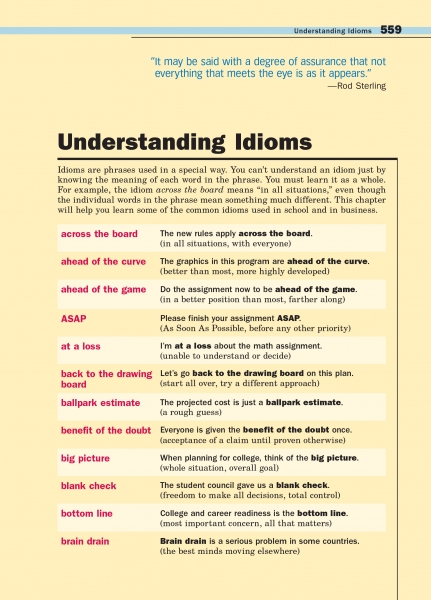Page 559 from

Start-Up Activity
Tell your class, "Most Ancient Greeks were idiots." Give them a moment to respond with incredulity. Then provide them this etymology for the term:
Idiot: Middle English from Latin idiota (ignorant person), from Greek idiōtēs (private person, layman), from idios (own, private)
That's right, the word idiot originally just meant "private citizen." And an idiom is a "private saying" or one's "own saying." In other words, an idiom is a phrase that means something other than what the words themselves actually mean. To understand an idiom is to belong in the private group in which it is understood.
All languages have idioms, and different groups have their own idioms. Knowing them helps you be "in" rather than "out."
Think About It
“Each person is an idiom unto himself, an apparent violation of the syntax of the species.”
—Gordon W. Allport

Start-Up Activity
Tell your class, "Most Ancient Greeks were idiots." Give them a moment to respond with incredulity. Then provide them this etymology for the term:
Idiot: Middle English from Latin idiota (ignorant person), from Greek idiōtēs (private person, layman), from idios (own, private)
That's right, the word idiot originally just meant "private citizen." And an idiom is a "private saying" or one's "own saying." In other words, an idiom is a phrase that means something other than what the words themselves actually mean. To understand an idiom is to belong in the private group in which it is understood.
All languages have idioms, and different groups have their own idioms. Knowing them helps you be "in" rather than "out."
Think About It
“Each person is an idiom unto himself, an apparent violation of the syntax of the species.”
—Gordon W. Allport
